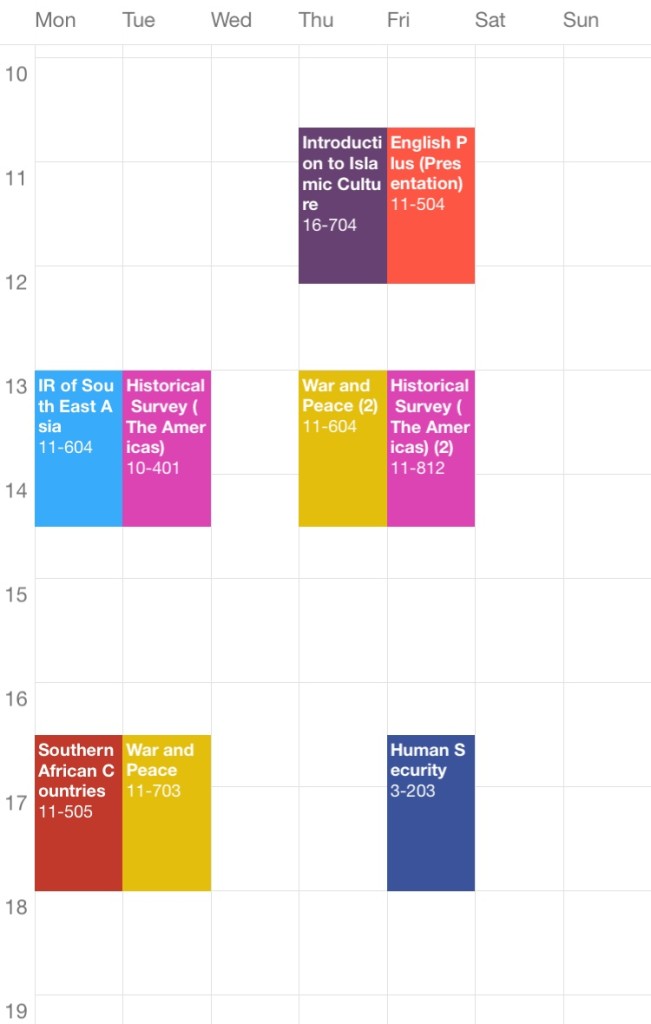As an undergraduate student, it is not easy to manage your time between your studies and non-campus activities, especially when you are studying abroad. Losing focus and shifting priorities can end up being a possibility. In this article, Made Ayu Sayaka, currently studying at Waseda University, shares her struggles on time management during college and gives some advice on juggling a numerous amount of activities.
Being a second-year student at Waseda University is really fun yet very challenging at the same time. Between classes, part-time job, school clubs and other organizations, it is hard to juggle all of them simultaneously and still giving your best commitment. This is my experience. Be mindful that this is a story and opinion of one person and does not necessarily reflect other students’ experience.
I will start by telling you briefly about my background. I am a second-year undergraduate student at Waseda University, currently studying Liberal Arts with a concentration in International Relations. I moved to Tokyo around one and a half years ago and this is my first time studying abroad.
Most Japanese college students immerse themselves to do many other activities besides studying. This is due to several reasons– to prepare themselves for job-hunting, to earn money, or simply to gain real-life experience. Like many other Japanese students, I juggle between my study, part-time job, internship, my college’s clubs, outside-college organization work. This is my experience juggling them at the same time.
The main activity which takes up most of my time is, of course, my studies. As a scholarship student, I have the pressure to maintain high grades here. My classes usually begin at noon and end at 6 p.m. I took many classes during my first year, but the amount has lessened considerably once I became a second year–I now have only around 2 or 3 classes per day class. Each period runs for 1.5 hours and is worth 2 credits. Last semester, instead of paying attention to the lectures, I would record the lectures and do other assignments in classes. This made me left behind in lectures and I scrambled to get through, rushing to catch up with the materials one week before the exams. In the end, my grades suffered significantly, and I felt like I was studying just to pass the exams instead of understanding the materials. Doing other kinds of work in lectures is not worth it; it is better to pay attention in lectures and do that other work afterwards.
This is my class schedule for last semester (Fall 2017 semester):
I also do a part-time job as an English private tutor. I only work once a week, for 2 hours. The issue that I see in Japanese students is that many people commit too much shifts to earn more money and fail their studies. Some students can put as much as 40-hour shifts per week. They work late nights and then they miss their morning classes, and their grades suffer in turn. There is a funny (or maybe not) story from my professor about how his daughter worked too much during her third year that she had to delay her graduation for one extra year. After my professor calculated the costs, it turns out that the tuition fee for that extra year of her study equals to the amount of money she earned from her job. Ironic, isn’t it? So I strongly recommend on being careful with the amount of time you spent for work each week. Yes, the pay is good and the money enables you to travel and shop, but as a college student, always prioritize your study first.
Other than my classes and a part-time job, I also have my internship. I am doing my internship at a Japanese real-estate company. My work consists of writing articles for their website in English and translating them into Japanese and vice versa. It is a part-time internship which takes up 10 hours per week, which is quite demanding. Japanese companies are very strict with deadlines, so sometimes it can get quite stressful. There are many nights where my intern work is due at the same time as my essay assignments, and this resulted in me rushing through both of them. Thus, I would not recommend doing an internship during the semester. If possible, it is better to do a full-time one during your school break, for example, a 2-month internship during your summer break. This way, you can give your best work for your intern company and not sacrifice your grade.
Last but not least, I have my school clubs and other non-campus organizations I am involved in. Some of these clubs do not take up much time at all. For example, I am currently joining TEDxWasedaU as the design team member, but this only gets busy before events. Other than the pre-event prep, there is no other work needed. The club/ organization that takes up most of my time would be PPI Jepang (the Indonesian Student Association in Japan). As the leader of the design team, I am responsible for making sure all posters are finished before the deadline. Luckily, all the work is done remotely so I usually do the work during a free period in between my classes.
That being said, I do not consider my self good at managing time. There are many times that I could not give my best for my work because I procrastinated instead of doing it right away. I could have written a better essay had I started days before and not the day before the deadline. Once, I got sick because of my poor sleeping pattern during exam week, and this resulted in me frantically e-mailing my professors for a make-up exam. Time management is something that I’ve never had to worry about before in high school. It is better to learn time management and how to have a good work-life balance before you start working.
So, what did I learn from all this? I learned to not do more activities than your time allows. If you can’t make the time and effort for it, then don’t do it. It is better to get involved in a few activities but really commit to them than doing so many activities if you can’t focus on any of them. When I arrived here I was baffled by the sheer opportunities available and I just wanted to get involved in all of them. It is very tempting, but be careful to only commit to few.
As a student, college comes first. Always prioritize your studies. Avoid doing part-time jobs if it means sacrificing your grades. The third advice is to maintain a healthy lifestyle. Try to get a good 8-hour sleep every night. There is no point in pulling an all-nighter to study if you get sick and miss your exams in the end. And of course, have regular meals. If you are living alone for the first time, it is really easy to forget to eat.
To conclude, studying abroad brings many challenges, and maintaining a good work-life balance is crucial. Studying in Tokyo can get stressful sometimes, but it is very rewarding. The key is to know when and what activities you should cut back to achieve a good balance. As always, best of luck to all students abroad 🙂








